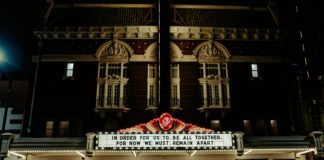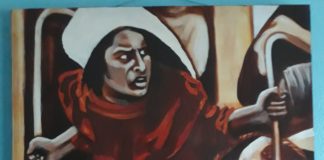If the fear phase of my pandemic journey fused suddenly, and if the state of euphoria came as the crest of a wave, the third stage of depression arrived more like fog rolling in, a malaise that crept upon me slowly.
As I suggested in my first essay, the catalyst of the cancellation of the SXSW festival made the reality of the pandemic stark and ushered in fear. In reaction, as I and others at data.world scrambled to invent new ways to collaborate, create, and sell, the accumulation of successes culminated in the period of euphoria that was to follow. But the arrival of depression was subtle, coming in fragments that more slowly contoured into my reality.
While I certainly understood the frustration with the lockdown, Gov. Greg Abbott’s May decision to make Texas the first state to repeal its stay-at-home order worried me deeply going into June. My fear that we were wasting the health capital we had accumulated through great sacrifice was confirmed in mid-July as new COVID-19 cases broke a one-day threshold with 10,000 hospitalizations and the surge continued into August. We had accumulated at least another $2.2 trillion of debt – plus a tremendous amount of stimulation by the Fed – to bend the curve, and now we were throwing away the “gains” of doing so.
Like so many, I was reeling from the murder of George Floyd by police in Minneapolis. The passion I’ve long felt for the need for Austin and the rest of America to reconcile with our racist history has only strengthened since the pandemic revealed its depths. I was frustrated with White friends who criticized the national uprising of protests that ensued in more than 550 cities, led by Black Lives Matter. Data.world was one of the first companies in Austin to make Juneteenth a corporate holiday. My good friend Dr. Peniel Joseph kicked off that day of reflection for us, and quite a few of our investors and advisory board members attended too.
More questions than answers about racial reckoning
So I reached out in various ways to explain the pointlessness of transference of anger to legitimate, cathartic, and largely peaceful protests. And I was equally sad about the emotional and similarly illogical calls to “Defund the Police,” which branded the movement with something far different than what the movement actually represented or sought.
I asked myself: How will we resolve this and come together, and stay on message about what really mattered here to help lift up our fellow Black American citizens and other citizens of color? It’s a question that lingers. The challenge is daunting, I realized. I brought that voice into my White Men for Racial Justice group, seeking answers.
The tendrils of this depressing fog quickly combined with the other dark mists coiling. For me at least, this was in many ways the start of the rapid spread of what I’ve called the “secondary virus,” that of nonsense, denial, and anti-mask political posturing. There was still no federal plan and the lack of testing – and the time to get results back – was the scandal that it frankly remains. And I was disturbed that our governor participated and continued to quarrel with my good friend Austin Mayor Steve Adler even as Abbott reluctantly tapped the reopening brakes a bit. I knew that Mayor Adler cared just as much for our small businesses as he did for our citizens. How did a pandemic – the first of my lifetime – become a partisan issue?!
The sheer number of deaths was numbing even as they are so overshadowed today. On July 25, there were 2,466 deaths nationally which brought the U.S. pandemic total to 146,313. The rush to develop vaccines was well underway, but convincing optimists were few. I began to wonder when — in darker moments even if — we would have a vaccine. The previous speed record for a vaccine (for mumps) had been four years.
By July, business closures since the start of the pandemic had reached 80,000 nationwide, with 1,500 in Austin alone — including such iconic restaurants as the original Threadgills and Magnolia Cafe. I knew many restaurant entrepreneurs and it was bloody out there. The American Bankruptcy Institute published a study predicting a national rise in bankruptcies of at least 36 percent.
Strange ironies in a relentless pandemic
While at data.world we were doing well commercially, as our workforce actually grew to more than 70 by August, interest in our COVID-19 Data Resource Hub waned. This came as one amid the many strange bundle of pandemic ironies. On June 8, the S&P 500 climbed back to where it had begun the year. This was on the very same day that economists declared the United States formally in a recession, as jobless claims remained above one million for the 12th week in a row.
The flagging interest in our COVID-19 hub seemed almost as if it was inversely correlated with the recovery of the stock market. In retrospect, it was probably a non-correlation and likely just COVID-19 fatigue. But the symbolic meaning — good and bad — was weighty. From the standpoint of resilience, of people “getting back to it,” I took this as a positive. But from the standpoint of people needing to focus even more intensely on a worsening plague — staying distanced, masked, and careful — this seemed at one with the spreading denialism.
On a personal level, we were fine. The children had migrated quickly and successfully to online learning. Debra and I were getting to spend more time together than usual as well as with the kids. I was and still remained deeply grateful for our good fortune as we all witnessed on a daily basis the growing pain and misery around us. But one can only be a stoic for so long, and the family summer vacation has long been a paramount moment. First we pushed our plans for Hawaii from June to July. Then, from July to August. Then we cancelled it altogether. It made for a very long summer.
How long was this really going to last? How many of our citizens was it going to kill? How were we going to pull together as a country, in some form of unity to fight the virus, address racial injustice, save our small businesses, and bridge our vast political divide? When was I going to get to see my team in person again? It had been so long, and I chuckled to myself about our original two week work-from-home plan. I’m an optimist, not a cynic, but it was really settling in – this was going to be a long haul through the darkness. There was so much on my mind, and it was all incredibly overwhelming. I soldiered on, stepping up my efforts politically and focusing on data.world to the best of my ability.
I’ll never forget the summer of 2020. The summer when so much was shrouded in fog.






